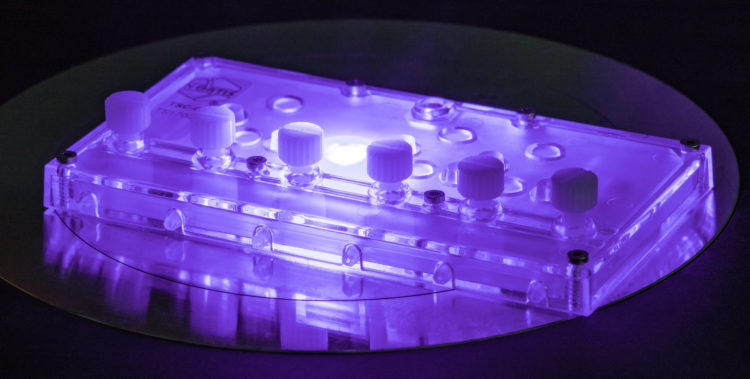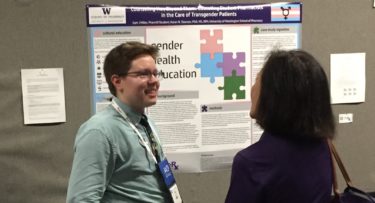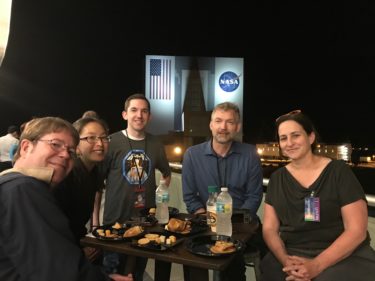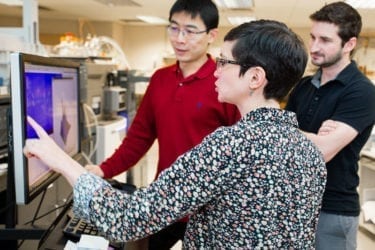
Celebrating 125 Years of Impact & Innovation
Our mission is to develop exceptional pharmacy leaders and researchers, discover solutions to improve population health, and serve the health and well-being of the public, locally and globally…even in space.
“We aren’t waiting for the future to happen. We are proactively accounting for what these changes mean and preparing our student pharmacists and researchers to think critically and be able to adapt to whatever policies, innovations, or technologies are to come.”.—Sean D. Sullivan, Professor and Dean, UW School of Pharmacy
At the University of Washington School of Pharmacy, we embrace diverse perspectives, beliefs and cultures and work to serve the greater good of society.
When pharmacists are open and educated on how to support their patients, the quality of care improves. Through our training, research, and outreach, we make sure we are taking care of people–whatever their needs are. Our work matters and we make a difference.
In 2009, then student, now alumna, Joanna Preker, ’12, worked with I2P2 Endowed Clinical Professor Don Downing, ’75, to advocate for improved patient access to sexual and reproductive health services. Founded and named by Joanna, Pharmacy for Reproductive Education and Sexual Health (PhRESH) was a first-of-its-kind pharmacy student organization. Her novel efforts were successful, resulting in increased access to health care for women and families in Washington and elsewhere.

Sam Miller, PharmD candidate, class of 2020, an active PhRESH member, is leading the way in supporting transgender patients. He has created a toolkit and resources to train pharmacists in how to communicate they are a welcoming pharmacy—from asking for preferred pronouns to wearing pronoun buttons on lab coats. Sam’s programs include the technical aspects of supporting transgender patients including training them on injecting hormones, helping with insurance coverage questions, and more. Sam won an award at the WSPA Northwest Pharmacy Conference for his research poster on training pharmacists to support transgender patients and recently did a rotation at the Human Rights Campaign.

We are boundless in our efforts to improve health care. In 2019, faculty members Ed Kelly, Cathy Yeung, ’05, ’13, and their team, along with collaborators at UW Medicine and Kidney Research Institute, watched live at Kennedy Space Center in Cape Canaveral as the Kidney on a Chip project launched to outer space. The project aims to help people on Earth and future astronauts on missions to Mars. One of the challenges of spending years in microgravity is that there is a high increase in kidney-related health problems, including osteoporosis and kidney stones. The team hopes to gain insight into that rapid aging process through the microphysiological chips.
Thanks to donors like Richard, ’54, and Susan Coar, we continue to support forward-looking research projects like those supported by UWSOP Faculty Innovation Awards. Pharmacy’s Brian Werth and Medicinal Chemistry’s Libin Xu received funds to support their novel research into antibiotic resistance mechanisms in the superbug, methicillin-resistant Staphylococcus aureus (MRSA), which has led to a $1.86M NIH grant.

inaugural award from the UWSOP Faculty Innovation Fund, which provides financial support for one to two awards of up to $20,000 each for high-risk, innovative research projects. Photo: Alex Levine
An interdisciplinary team led by CHOICE Professor Beth Devine, with Pharmaceutics’ Isabelle Ragueneau-Majlessi, ’10, and Pharmacy’s Shelly Gray and Jennifer Wilson Norton, ’93, earned the Faculty Innovation Award funds for their research on using pharmacogenetic testing on clinical outcomes in retirement communities. UWSOP’s Jennifer Bacci, and Basia Belza, from the UW School of Nursing, are serving as advisors. Abhi Nath is looking for new ways to predict how the body metabolizes biologics, also known as “large-molecule” drugs or protein-based therapeutics. These drugs display immense potential in the treatment of many challenging forms of cancer, autoimmune disorders, and infectious and degenerative diseases, but little is known about the factors that govern their pharmacokinetics and disposition. Professor Allan Rettie’s team seeking new personalized ways to slow the progression of the development of breast cancer by focusing in on an enzyme, CYP4Z1, that can go rogue, which may lead improved therapies that are custom for a patient’s particular type of breast cancer.
These interdisciplinary approaches to training are indicative of the multi-disciplinary approach to solving problems of population health. We are proud of the tradition of alumni who are both pharmacists and researchers, including Dave Veenstra, Beth Devine, Jean Dinh, ’05, ’09, ’14, Ryan Hansen,’03, ’12, Jonathan Watanabe, ’98, ’08, ’12, Cara McDermott, ’11, ’12, ’16, Cathy Yeung, Cate Lockhart, ’04, ’13, ’16, ’16, Todd Lee,’01, Kai Yeung, ’15, and Lindsay Henderson. The problems of health and the health care system are intertwined and complex. It will take leaders like our alumni to create a world where all people can live healthier and more fulfilling lives.